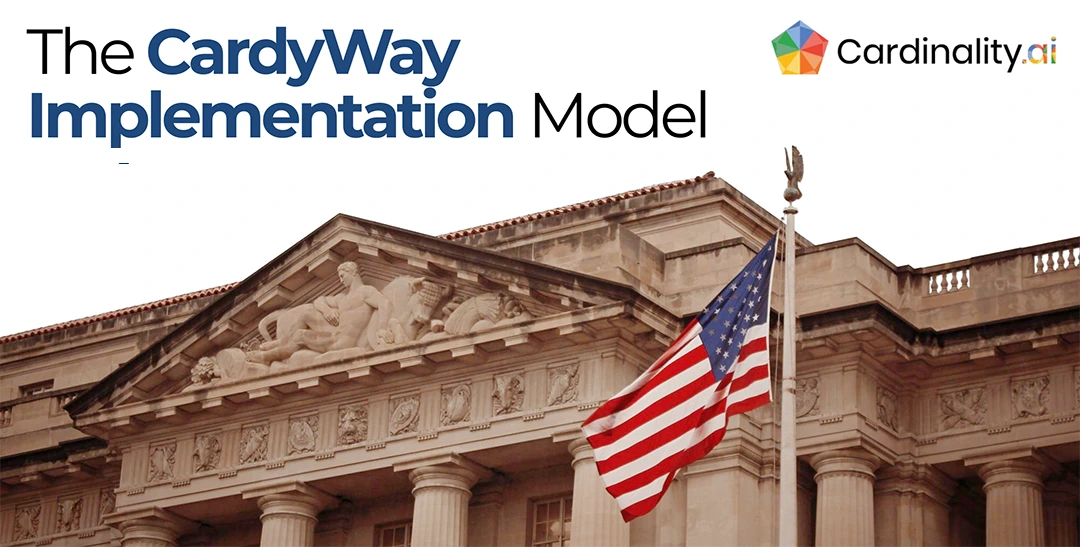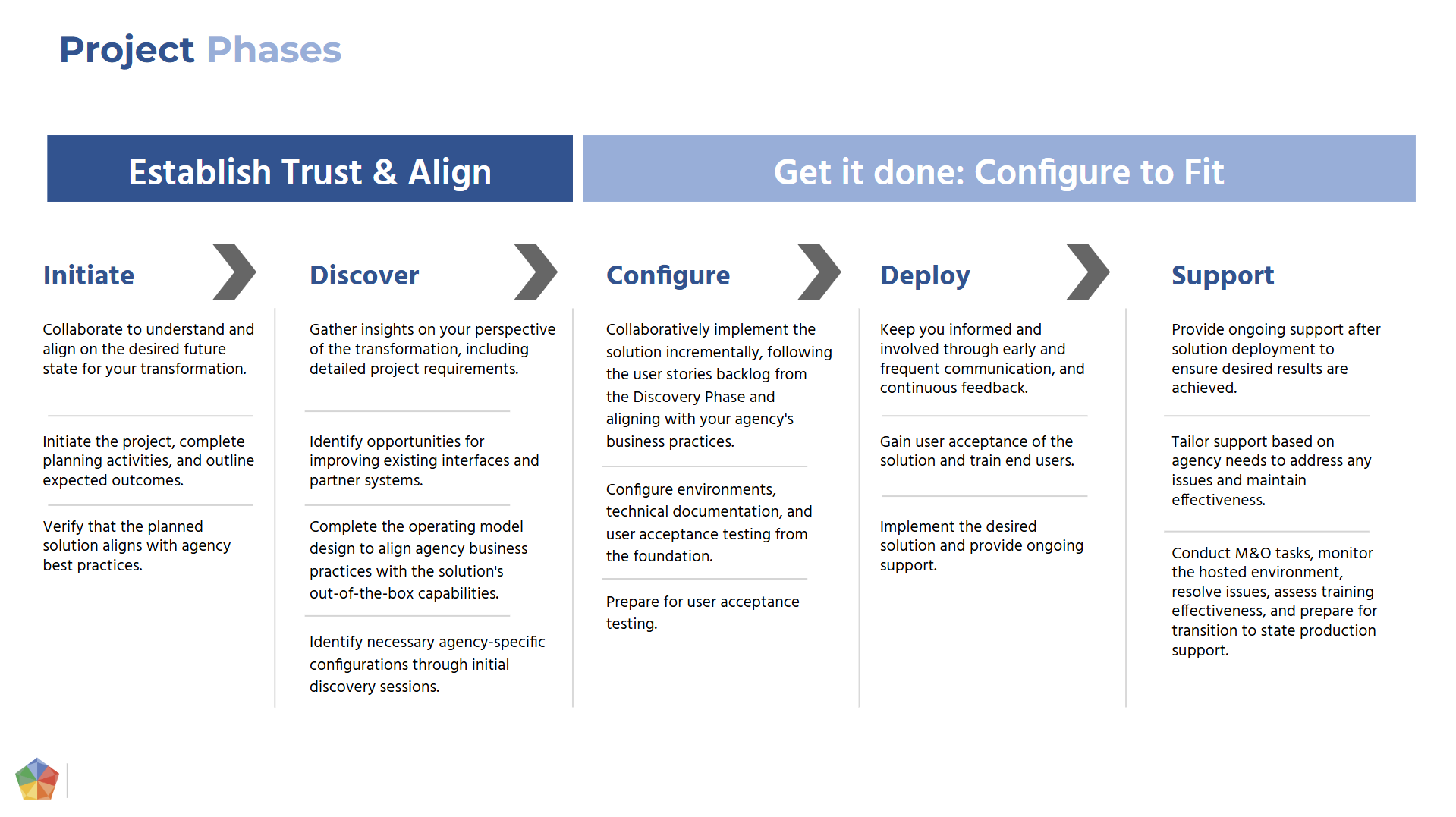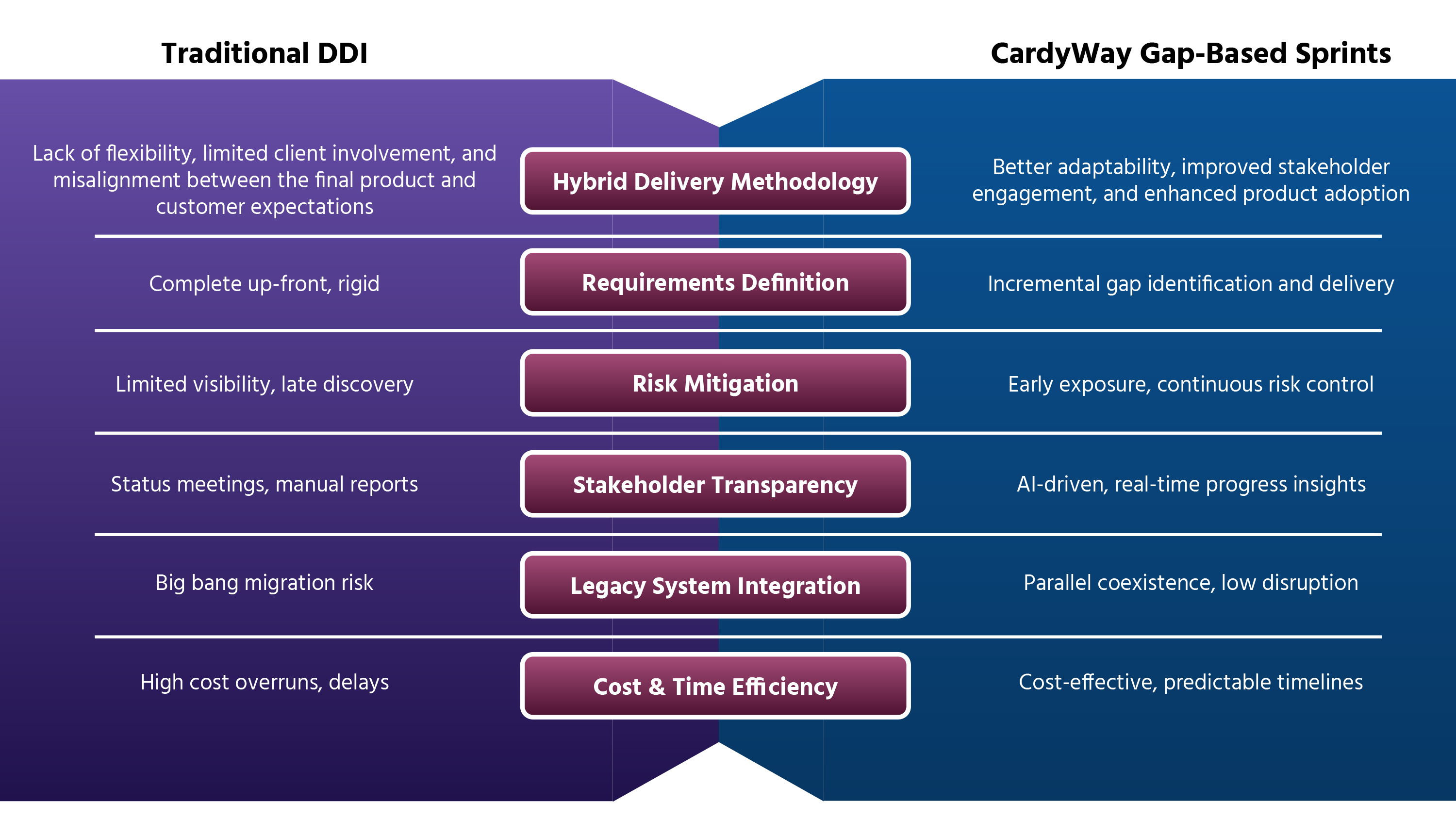
The CardyWay Implementation Model
Government technology modernization faces several challenges today—not just from technology capability, but outdated delivery methodologies. Traditional Design, Development, and Implementation (DDI) approaches adopted in traditional implementation approaches often result in missed deadlines, cost overruns, and low transparency during implementation. What this also results in are inflexible systems which are unable to adapt to evolving agency needs.
The CardyWay Implementation Model is a transformative methodology purpose-built for complex government programs. Using pre-built modules and AI-powered gap-based sprints, CardyWay enables us to deliver an initial working system with incremental, transparent progress until go-live. It significantly reduces risk and cost, enabling public sector leaders to confidently accelerate digital transformation while serving stakeholders throughout the journey.
“Drawing on experience consulting with global governments at BCG on digital government initiatives and understanding the government policy perspective, it has become clear that modernization efforts often falter not because of technology limitations, but because delivery approaches fail to keep pace with evolving program goals. Effective transformation requires methods that embed adaptability, transparency, and iterative validation into every stage of execution. As one guiding principle emerged through this work: Technology succeeds in government only when delivery moves in lockstep. These lessons shaped the foundation for a delivery model designed to turn intent into measurable outcomes—fast, transparent, and accountable from day one”

Akshara BaruDirector, Customer Success and Family Outcomes
The Challenge with Traditional GovTech Delivery
Large-scale government system modernizations are plagued by common pitfalls:
- Rigid development cycles that make changes costly and disruptive to project timelines
- Limited stakeholder visibility, with reliance on manual reports and meetings to gauge project status
- High risk and cost overruns caused by complex data migration and legacy system integrations, poorly scoped in traditional models
- Overemphasis on low-value-add documentation milestones diverts time and resources from meaningful progress
These factors lead to increased failure rates, distrust, and delayed benefits to the communities the systems serve.
CardyWay: An Innovative, Proven Alternative
Gap-Based Sprints for Rapid Value Delivery
CardyWay begins with a solution Version 0 (v0) that addresses the majority of program needs within 30 days of project kickoff. From this baseline, the solution evolves via incremental gap-based sprints (v0.1 → v0.2 ... → v1.0), each delivering usable, tested functionality. This iterative approach:
- Exposes risks early by enabling real use and validation from the start
- Maintains transparency with measurable progress updates at every sprint’s close
- Accelerates time-to-value by delivering tangible outcomes instead of months of invisible development
AI-Powered Governance & Transparency
Leveraging AI, CardyWay integrates metadata from tools like Jira and GitHub—including requirements tracking, estimates, and defect management—to power real-time status reports. This eliminates dependency on manual status updates and provides stakeholders with instant, trustworthy insights into progress. The AI Assistant for Audit and Validation also autonomously verifies delivered pages, workflows, and implementation completeness.
Coexistence with Legacy Systems
Recognizing that legacy platforms cannot be retired overnight, CardyWay supports parallel operation while gradually modernizing capabilities. This phased coexistence mitigates disruption and migration risk, ensuring continuous service delivery during transition.
Built for Flexibility & Lowest Total Cost of Ownership
The pre-built EmpowerPlatform based solutions that accompany CardyWay are highly configurable, allowing rapid adaptation to unique agency policies, workflows, and regulatory changes without costly rebuilds or rework cycles. This adaptability reduces long-term maintenance costs and optimizes staffing needs.
“Over the years, I have seen how government legacy modernization initiatives have struggled with rigid, waterfall-style project management and overly complex systems that fail to evolve with the times. The outdated approaches have often resulted in delayed timelines, budget overruns, and frustrated stakeholders. Three decades of delivery experience have revealed key lessons about what works (and doesn't) when it comes to government technology transformation. In particular, the traditional "big bang" methods often overlook the importance of agile, iterative progress. It became clear that adopting a flexible, iterative model—rooted in actual delivery experience—was crucial to overcoming the complex challenges of legacy systems and ensuring that government technology truly met the needs of its users. The CardyWay implementation emphasizes a gap-based sprint approach—an approach that centers on rapid, measurable progress and continuous feedback. This approach not only empowered teams to move faster but also provided a better framework for managing risk and securing buy-in from the stakeholders.”

Ashwini ChhariaVice President, CardyWay Implementations
Real-World Deployment & Impact
| Project & Agency | Timeline Highlights | Outcomes & Benefits |
|---|---|---|
Georgia DHS Communicare Portal | v0 in 30 days; v1 by 6 months | Streamlined foster parent communication; faster responses |
Georgia DPH Grants Management | Iterative gap sprints over 6 months | Improved data accuracy; faster compliance reporting |
West Virginia DoHS Foster Care | Rapid v0 start; Phase 1 live in 10 weeks | Enhanced collaboration; reduced data errors; increased stakeholder access |
San Mar Family & Community Services | Continuous quarterly releases | Operational transparency; improved community services |

These implementations consistently demonstrate accelerated delivery, real-time status confidence, and stakeholder empowerment, validating CardyWay as a scalable and replicable framework.
“Throughout my thirty-seven years in IT consulting, I have repeatedly seen projects fall behind schedule due to slow project initiation, and once delayed, they were rarely able to get back on track. Adopting the CardyWay methodology centered around the EmpowerPlatform provided our clients the ability to hit the ground running, realizing value faster and reducing implementation risk. By leveraging our platform, cloud-native scalability, and reusable project management and system development lifecycle templates, we bypassed lengthy infrastructure setup and focused immediately on discovery, gap analysis, and platform configuration. This approach accelerates time-to-citizens, minimizes disruption to existing workflows, and ensures the resulting solution is fit for purpose. Ultimately, the CardyWay minimizes non-value-added tasks, enabling us to be more agile, responsive, and cost-effective — turning strategic initiatives into measurable outcomes in a compressed timeframe relative to traditional system implementations.”

Stacy NightSenior Leader, GovTech Implementations
Why CardyWay Outperforms Traditional Models

Conclusion
The CardyWay Implementation Model represents a transformational shift in how government IT modernization projects are planned and executed. It puts certainty, speed, transparency, and adaptability at the forefront, establishing continuous stakeholder empowerment and minimizing disruption to public services.
Public sector leaders, policymakers, and technology partners seeking proven outcomes are invited to engage with Cardinality to explore pilot programs or partnerships to bring this new gold standard to their agencies.
The CardyWay: AI-powered implementation. Fast. Certain. Real.
Cardinality.ai | www.cardyai.com
About the authors

Ashwini Chharia is a digital strategist and a Vice President - CardyWay Implementations at Cardinality. He helps governments throughout the United States provide better services to the citizens they serve. With over 37 years of technology experience, Ashwini’s insight is powered by a wealth of hands-on experience implementing large-scale projects in both the Public and Commercial sectors. A broad base of technology knowledge and practicality make Ashwini uniquely suited for his current leadership roles in Cardinality. Ashwini has held many senior IT leadership positions spanning multiple aspects of IT, including project management, sales, marketing, operations, strategy, and innovation. Ashwini holds a Bachelor of Engineering degree in Electrical and Electronics from BITS, Pilani, India.

Stacy Night is a digital program manager and a Senior Leader, GovTech Implementations, at Cardinality. He helps governments throughout the United States provide better services to the citizens they serve. With over 37 years of consulting experience solely with public sector agencies, he possesses a wealth of hands-on experience implementing large-scale projects that modernize technology and improve outcomes for citizens. He has working experience across multiple technologies from mainframe to the cloud; multiple vertical practices such as human services, workforce development, healthcare, and public utilities; and all phases of the system development lifecycle from planning to implementation. Stacy’s educational background includes a Bachelor of Science degree in Economics from the Wharton School of the University of Pennsylvania, a Master of Public Administration from the LBJ School of Public Affairs at the University of Texas, a Master's in Business Administration from the Graduate School of Business at the University of Texas, and a Master's in Medical Informatics from Northwestern University.

Akshara Baru is a digital government specialist and a Director, Customer Success and Family Outcomes at Cardinality. She has previously worked with BCG's Center for Digital Government and State governments in India on digital transformation. She briefly consulted with UNDP Accelerator Labs in New York, supporting them with a social innovation scaling strategy. Akshara holds a Master of Public Administration from Columbia University’s School of International and Public Affairs (SIPA). She is passionate about building solutions that are usable and solve real problems.




